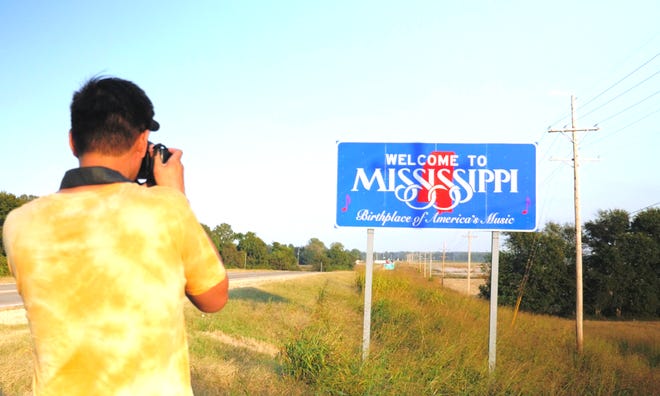
Baldwin Chiu, a Chinese American from California, knew his grandfather was buried in Mississippi. How he ended up in the Deep South, Chiu did not know.
With his father and brother in tow, Chiu traveled to Mississippi to learn his family’s story. What he discovered was a little known history of Chinese immigrants in the Deep South. The family’s journey became “Far East Deep South,” a documentary directed by Chiu’s wife, Larissa Lam.
“Far East Deep South” premiers on PBS’s WORLD Channel on Tuesday, May 4 at 8 p.m. EST / 7 p.m. CST. The documentary will also be streaming throughout May on WORLDchannel.org, PBS.org and the PBS Video App.
The American South: Baldwin, what brought your ancestors and other Chinese people to Mississippi?
Baldwin Chiu: Originally, the Chinese were brought into Mississippi to replace the slave labor. Some people that finished building the transcontinental railroad came into Mississippi through Memphis. Other plantation owners recruited Chinese from China to come to the Delta to work.
TAS: What was happening in China at the time that was encouraging immigration to the United States?
Larissa Lam: There was a civil war. There was famine. A lot of strife going on, which is why people sought opportunity in other countries.
TAS: Baldwin, tell me more about the store in Mississippi run by your grandfather and great grandfather.
BC: We found it in Pace, Mississippi.
LL: The majority of Chinese-owned grocery stores in Mississippi were in predominantly Black neighborhoods. The Chinese were not allowed to live in white neighborhoods. Most of the Chinese families actually lived in their stores as well. They worked long hours, seven days a week with very little breaks. It wasn’t an easy life to be running a store back in those days.
BC: They also had hot food. We heard a lot about the red hot dogs. They made Chinese food, too.

TAS: Why did so many of these Chinese immigrants open stores?
LL: The Chinese Exclusion Act of 1882 basically said you can’t be a laborer. That cut off the farming route and a lot of other jobs. They were forced to become merchants. Of course, the idea was if they can only be merchants, that’s going to force them to go home to China. But what the government didn’t anticipate was that they would be very resourceful. They pooled their money, because alone they couldn’t do it.
TAS: In the segregated South, what was the position of the Chinese?
LL: A lot of times they were classified legally as “colored,” the same as the Black community. Over time, they were sometimes accepted a bit more by white society.
BC: One of the more obvious things is schooling. In Pace, Mississippi, where my grandfather and great grandfather lived, they allowed Chinese to go to the white schools. Right next door in Cleveland, the largest city, they did not.
LL: In Mississippi, there was a period where basically the Chinese couldn’t go to either Black or white schools. They had to create Chinese schools just for them.
TAS: How many Chinese Americans remain in Mississippi?
BC: A lot of them have left. But many are still living in the South. They’ve moved up to Memphis, Houston, Texas and parts of Arkansas.
TAS: What made you decide to turn this personal journey into a documentary?
LL: I felt like people needed to know this history outside of the South, especially now when there is so much antagonism towards the Asian community. Hopefully, the film opens the door to other stories, because we realized after we did this film that there are Chinese, and other Asian groups, everywhere. We all learn about the American South, we just never learned that the Chinese were part of it.
Note: Interview edited for length and clarity.
News tips? Story ideas? Questions? Call reporter Todd Price at 504-421-1542 or email him at [email protected]. Sign up for The American South newsletter. Follow us on Instagram, Facebook and Twitter.
